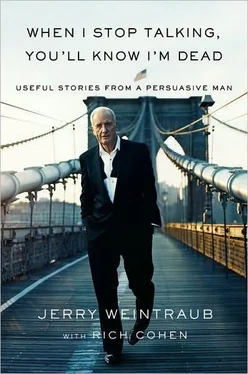He died of bone cancer. It was very painful, but it was not the pain that bothered him. It was being stuck in a hospital bed, removed from the game. Look at this joint! This ain't where the action is! But I did not agree. To me, Hammer was the action. He carried his own gravity-the definition of a great man. He died in 1990. When I think of him now, it is not the sick man I see but the immeasurably pleased man at the funeral in Moscow, grinning in pictures standing next to a casket. "What are you smiling for? Did you forget? Your friend died." But maybe Armand had it right. As long as you're here, you might as well smile.
People think that Hollywood and politics operate in different spheres-they don't. The world is very small at the top, with a few thousand players running everything. For a producer, an actor, a banker, a politician-name your celebrity-crossing genres is less a matter of making connections with the leaders of other industries than of climbing high enough in your own to reach the place where all lines converge. As I said, people describe me as a Republican powerbroker, a right-winger in the land of liberals, but that's not true. I am, in fact, a person who values friendship over politics, and I happen to have a lot of friends, which means I happen to have a lot of politics. As Hammer was friendly with both Lenin and Reagan, I am friendly with both Clooney and Bush.
If you were a Jew in New York when I grew up, you were a Democrat. Franklin Roosevelt was like a great-uncle to us, a benign presence who towered over everything. By watching him, you learned about power and prestige. He taught you that politics is more than conventions and elections, more than smoky backrooms. It's the neighborhood. It's life. It was Roosevelt who led the country through the Depression. It was Roosevelt who took on the Nazis. When he was riding high, we were all riding high. When he was licked, we were all licked. I consider Franklin Roosevelt the ideal leader, the president against whom all others are measured.
Of course, all of this was in the background; it was the world of adults. Politics did not become real to me until the late fifties, and then only because of a particular incident. I was working as a record plugger, traveling the Midwest and South to promote artists. Going into a radio station in Omaha, Nebraska, I bumped into a young man coming out. This was John Kennedy, then a freshman senator. (You can say I crashed into politics.) We fell into conversation in the way of northeasterners happening upon each other far from home, and formed an instant bond. He had finished his interview and was at a loose end. So he waited for me. We went around the corner and sat down for coffee. I fell in love with him. It took sixty seconds. The charisma came off him like shimmers come off a hot road. We had a picture taken together, standing side by side in the sun. I was added to the list of people who could be contacted, counted on. I later worked for him in the presidential election, making calls, getting out the vote. I was an advance man.
From Kennedy I learned that the best politicians are not different from movie stars. They charm, communicate, command. The good ones never make you feel isolated or small, as if they have something you don't. Quite the opposite. They include you in their world, enlarge you, make you recognize the best qualities in yourself. I saw this most powerfully with Ronald Reagan. George Bush had taken me to the Alfalfa dinner in Washington. At one point, I realized that everyone in the room had been on the cover of Time magazine. Secretaries of state, presidents, vice presidents. But when Reagan came in, everything stopped, everyone stared, then they rushed to him like moths to a flame. Whatever moment he was in became his moment. Whatever room he entered became his room. Some people have that. It's the intangible quality that sells tickets and pulls nations out of funks. It's where politics becomes showbiz, and show-biz becomes transcendent. A movie or piece of art can save your life in the same way your life can be saved by a policy or law. This is why politicians seek out movie stars, and why movie stars want to become politicians. They seek the same target, which is the soul of the people.
I've worked for many public figures over the years, for mayors and congressmen, and selectmen who wanted to become mayors. I've given money and advice, hosted fund-raisers and campaigned. Contributing money and resources is my honor and responsibility as a citizen of the greatest nation on earth. (I am, for example, very proud of my work with Not On Our Watch, which battles genocide in Darfur, and which was founded by George Clooney, Matt Damon, Brad Pitt, Don Cheadle, and myself.)
The most liberal politician I've ever worked for was probably Jimmy Carter. He sought me out, reaching me through a friend. This was 1974, even before he won the Democratic presidential nomination. He was just a peanut farmer from Georgia, a nobody really, just a governor, a long shot. I could give you a big, mumbo-jumbo reason why I did not want to support him, but the simple fact is, I did not think he would win. I bet horses that figure to finish in the money. As Dino said, "Don't be a sucker." But Lew Wasserman loved Carter. Just loved the guy. Honest. True. Integrity. All that. He called me and said, "Listen, Jerry, Jimmy Carter is going to be president of the United States. I want you to meet him."
I fought, resisted, dragged my feet. I finally agreed to do a little work for the campaign, just to get Lew off my back, and hosted a ten-thousand-dollar-a-plate dinner for Carter. Carter and I were supposed to meet at the Century Plaza Hotel in West Hollywood for lunch, where we would really talk. But I broke the date at the last minute. I told his people I had pinched a nerve in my neck, and it was simply too painful for me to leave the house. Well, a few months go by and what happens? The peanut farmer is elected president. I get a call. President-elect Carter wants you to meet him in Plains, Georgia. I took my son and daughter along-he was a little kid; she was a newborn. We landed on a strip about thirty miles from the Carter farm. I stared out the window as we drove. We went through endless rows of green crops streaming past the window. We finally get to Plains. The Carters were doing that southern hospitality thing. Yes ma'am and no sir and lemonade and whatnot-the kindness that can kill you. My children were taken into the yard to play, and a secret service agent brought me in to see Carter. As I was walking in, Cyrus Vance-the next secretary of state-was walking out.
President Carter was wearing work boots with his blue jeans tucked inside. He looked like Abraham Lincoln or something. We sat down. Rosalyn brought us coffee. "How is that pinched nerve in your neck?" he asked.
"I never really had a pinched nerve," I told him.
"I know that," he said. "But why didn't you want to have lunch with me?"
"Because I didn't think you were going to become president," I said.
"Well, I am president," he said.
"Yes," I said, "I can see that."
He wanted my help in Hollywood, gathering people, getting them on board with his programs. This was outreach. I became very friendly with him. His son Chip used to stay at our house when he visited California. I liked him. I liked the president, too. Then, about six months into his presidency, he invited me to a White House state dinner for Tito. It was a hot ticket. The dictator had never been to America before. Only 110 people are invited to these dinners, so it was an honor. But I could not go. I called the State Department and asked if they could do me a favor and invite my parents instead. They said, "We're sorry, Mr. Weintraub, we just can't. This is a big dinner. We have the Supreme Court justices and senators coming. The world wants to be at this dinner. We'll invite your parents to the next one."
Читать дальше

![Сьюзан Кейн - Quiet [The Power of Introverts in a World That Can't Stop Talking]](/books/33084/syuzan-kejn-quiet-the-power-of-introverts-in-a-wo-thumb.webp)










